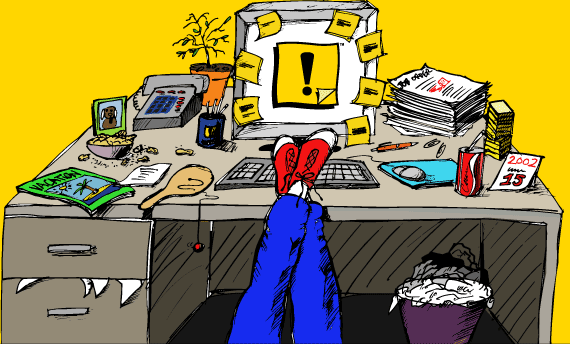Procrastination, when looked into, involves a series of “seemingly important” preparatory rituals that don’t actually do anything but delay the actual behaviour. Before engaging in the actual task, we believe that it is important for us to be relaxed and wholly prepared for it. This is where the problem kicks in. This is where we end up spending more time and energy engaging in preparatory rituals than the actual task itself.
I once handled a client, a young tertiary student, who always have to feel “settled in” before he can actually work on his assignments. This is where I learnt that procrastination contained some elements of obsessive-compulsive symptoms. There is something about his school work that distresses him in such a way that he needs to feel “settle in” first before he can work. Unfortunately this “settling in” involves a series of accomplishments in a computer game which takes him at least 30 minutes to complete. Besides the 30-minute ritual, come all the distractions with opening one’s computer. This can be true for all of us. (Disclaimer: I do not publicly share any direct cases which has not been closed for at least 3 years)
When we switch on our computers, we all know that we are not just there to check important emails. After concerning ourselves with emails, we have a tendency to open the news. What is worse for me is that I regard reading the news as “work”, so I don’t mind spending half an hour on it. After the news, we go to the social media and throw away another 30-minutes. When the rituals have been satisfied, we have already lost an hour or so of our work time, and at this point we already feel tired. Now it is time for a break and still the actual work remains untouched.
Perfectionism and the fear of failing
So why do we fear jumping straight to our work in the first place? We live in a society where we grew up hearing people say: “If you are not giving your best, don’t bother doing it at all.” This is one dangerous statement, especially to children. I can almost guarantee future procrastinators and obsessive-compulsives coming out from this irrational statement alone.
 Negative Perfectionism involves fears of making mistakes.
Negative Perfectionism involves fears of making mistakes.
Give your best in everything? Are you serious?! Do you know how much time I will need to brew “my best” coffee in the morning before going to work? Or are you saying that I should not have coffee at all?! How much time will I need then to iron my shirt and pants to their seamless state? Clearly, the ones who preach this outrageous line don’t have any clue of the concept of time.
In my work as a lecturer, I encounter students who check and recheck their work before submission (a torturous labour of love for the one who has to read their drafts). These are the same students who would rather leave a test item blank than receive a wrong mark for trying. Why is this? Because somewhere across their innocent lives, someone imparted to them that: “if you are not going to give your best, you might as well not do the task.” Meaning: “Be perfect and never make a mistake.” This perfectionistic fear is then installed in the person, and then comes self-doubt and all its compromise. All the rituals are developed to make sure that they have some excuse against their perfectionistic conscience saying: “I have already done my best!”
That’s what all the procrastination behaviours are: symbolic acts to convince ourselves that we have really tried our best. This mitigates the guilt and fears of making mistakes because they are already convinced of their efforts. Even though these planning and distractions merely wasted one’s time and energy and contributed nothing whatsoever to the real work at hand.
The Solution?
I have to admit, it is a lot easier typing this out than actually having it materialize in real life but what works with clients is to simply have them bypass all the vain rituals and lower one’s perfectionistic standards on things that one has to do. I am going to change your internal scripts of “being perfect” to “Just do it and complete something today.” As I keep telling my students: “better a mediocre submission than no submission at all.”
Just do it. Dive into the job and don’t listen to all your ritualistic needs. Inside, you will hear such thoughts:
“you haven’t had your coffee yet”
“you need to stretch and circulate your blood first”
“Check your phone, there may be an emergency…”
Ignore all of these! Give yourself an hour or the time that you need to complete this task and during this time, you are to ignore all these distractions. Don’t bother about your to-do list or your worries about the future. For this one hour, focus on the task at hand and get rid of it one and for all.
Get rid of Negative Perfectionism
I have to state it clearly that my goal here is not to lower down people’s standards. The goal is to have you get things done. As opposed to trying to do things perfectly all the time, I am here to encourage you to simply type that cover letter or assignment and hit the SEND button once it is completed. You don’t have to worry about tiny errors that don’t really matter to anyone.
You have to complete a project or you have to submit an assignment; whatever it is, you have to accomplish something. Well, you ought to be doing it according to your skill and resources for the given task. If you are a shoe maker tasked to make a leather bag, then make the best leather bag that you can finish in a reasonable time. There will be no point to spend more time with it as the shoe maker would be better off spending his time making shoes.
What if I don’t come up with a good work? Well, does it really matter? If it does then you already know that you have come up with what you can do (does it matter if it’s your best?). If you hate the assignment tasked to you, then just get it over with; work on it, finish it, and then submit. You can now move on and spend more time to activities that you really enjoy engaging in.
 Working without fear: Key to being your true self and the key to happiness
Working without fear: Key to being your true self and the key to happiness
“Just do it” is the lesson for the day. Do what you need to do. You don’t have to enjoy it, you don’t have to feel good while doing it, all you need to do is to complete the task that you have to complete and move on to the next. There is no need for vain rituals and false expectations to derail you. Set aside your ‘junk work’ without expending much resource and focus your time and energy on things that you really love doing. With this, you will be more effective and you will definitely be a lot happier.
